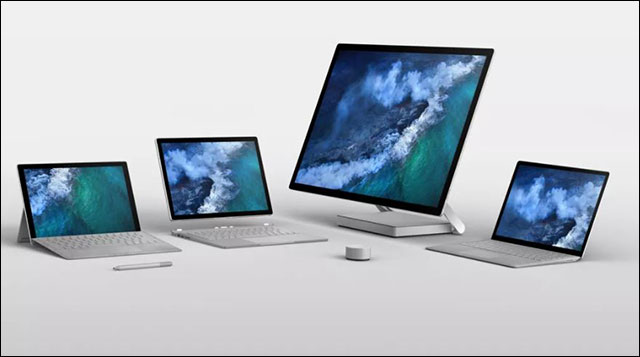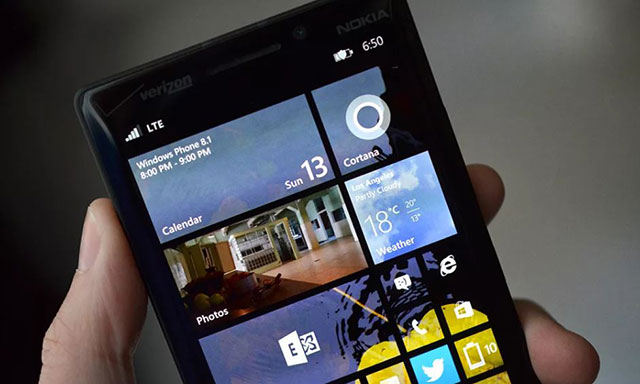Microsoft is ready for a world farther than Windows
'We want people to switch from needing Windows to selecting and loving Windows. That's our bold goal , 'said Microsoft CEO Satya Nadella three years ago. They then revealed more details about Windows 10 and surprised people with new technologies like HoloLens headsets.
At that time, there were many opportunities when Microsoft said that many people liked Windows, that Windows 10 ran over 1 billion devices in just 3 years. But now, Windows is probably no longer a key point for Microsoft's future success.
Microsoft has just announced a new reform. This is their 4th big change in the last 5 years and is also the most important during Nadella's term. Microsoft is dividing Windows into small parts. Windows' main development team switched to cloud and AI groups, and a new team took on the "experience" for Windows 10 users such as applications, Start Menu and new features.
There will be many changes in the near future, but looking at the 1300 letter from Nadella's sent to the staff there is no doubt that their future will focus on cloud computing and artificial intelligence (AI).

Which device runs the operating system is no longer really important
The first major sign of the OS's future is ' Windows & Devices Group ' changed to ' Experiences & Devices ', including Windows, Office and Surface. Rajesh Jha, who is in charge of Office, will manage the whole, in which Windows is just a slice of small cake.
Experiences (Experiences) also show how Microsoft and Nadella see operating systems in a larger computing context. Android has more than 2 billion active devices monthly, Apple devices hold 1 billion numbers. Microsoft has always said there are 1.5 billion users of Windows but there are also signs that this number is declining. There are over 600 million devices running Windows 10 (as of 11/2017) including PC, tablet, Xbox One, HoloLens and even Surface Hub.
600 million Windows 10 users are a big number but only half of Microsoft's original goal. Microsoft has 3 years to reach the 1 billion target, but mostly relies on Windows Phone. They abandoned the goal after only 1 year and said that because the mobile segment was not successful. Windows no longer dominates computers and Microsoft has to switch to 'experience' on many devices. Even the Xbox is geared towards the game in the cloud and has its own future.
- Windows 10 reached the milestone of 600 million units
- Microsoft's dream of Windows on phones is dead, now is the time for Plan B
Giant Groove Music technology giant, replaced by Spotify. Kinect also left and Windows Phone finally confirmed its rest. Microsoft now wants both iOS and Android to work with Windows 10 and they also realize that Windows is no longer a heavily used platform, thanks to the development of the mobile segment.

Windows Phone is no longer available but Microsoft has a different direction for mobile
Windows 10 focuses on 'creativity' (Creators) with 2 major updates over the past time, adding Mixed Reality, 3D Paint, improved touch pen. Universal Windows Apps seem to be the future for Windows to go up many devices, but not many mobile OSs use it. Developers mostly bundled desktop applications for Microsoft Store and the future of Windows 10 apps seems to be web applications.
- The next update of Windows 10 will be called Spring Creators Update
- Microsoft's decision to turn Windows 10 S into a mode instead of an ordinary OS version
Currently, Windows is much older than Windows 10. Much more impressive than Windows 8. Microsoft has been listening and changing OS appropriately. But Nadella looks at the future in a different way, no longer obsessed with Windows. Especially when their cloud industry is thriving, competing directly with Amazon's dominance and defeating Google.
- AWS and Azure dominate the cloud world, above all, no one wins
- Microsoft shook hands with Amazon to beat Google rival cloud computing
Windows does not die but only has a different role to Microsoft. Applications for many platforms such as Office 365 are very successful and Microsoft expects two-thirds of Office users to switch to Subscription next year.
Although it has changed itself to meet the requirements of the new device, Windows is no longer a core part of Microsoft. Nadella said 'the future of Windows is bright', but also said that it would connect 'deeper' to Windows 365, for companies that buy Office and Windows in the same package.
Users no longer have to buy Windows-compatible devices, even listing 10 desktop applications for everyday use is difficult. The only exception is the game segment, but Microsoft has not developed enough. PC games run on Windows just because that's where they release the game, then the mobile OS will soon catch up. Thanks to web and Chrome, it's easy to imagine the future that using the service / application will be more important than running on any OS.
Interested readers can read the letter from Satya Nadella here: https://news.microsoft.com/2018/03/29/satya-nadella-email-to-employees-embracing-our-future-intelligent-cloud- and-intelligent-edge /
See more:
- Microsoft released a tool to run any version of Linux on Windows 10
- Microsoft's future is a smart mode on smart devices
- How is Microsoft turning Android into a mobile OS for Windows?
You should read it
- ★ Cloud computing can develop in a relatively different direction in the next few years
- ★ Microsoft and Oracle, along with the 'matching swords' against Amazon in the cloud computing battle
- ★ Microsoft upgraded the cloud experience for users
- ★ Microsoft's cloud services grew by 775% amid the corona virus pandemic
- ★ Compare AWS and Microsoft Azure